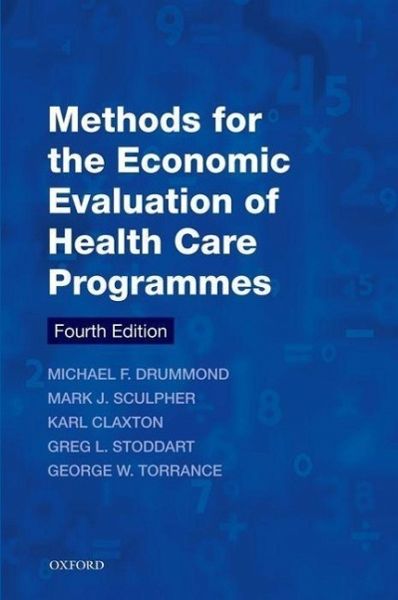
Michael F. Drummond (University of Yor Centre for Health EconomicsMark J. Sculpher (Centre for Health Economics, University of York,Karl Claxton (Centre for Health Economics, University of York, UK)
Broschiertes Buch
Methods for the Economic Evaluation of Health Care Programmes
Versandkostenfrei!
Versandfertig in ca. 2 Wochen

PAYBACK Punkte
32 °P sammeln!




The purpose of economic evaluation is to inform decisions intended to improve healthcare. The new edition of Methods for the Economic Evaluation of Health Care Programmes equips the reader with the essential hands-on experience to undertake evaluations, providing a 'tool kit' based on the authors own experience of undertaking economic evaluations.
Michael Drummond, BSc, MCom, DPhil is Professor of Health Economics and former Director of the Centre for Health Economics at the University of York. His particular field of interest is in the economic evaluation of health care treatments and programmes. He has undertaken evaluations in a wide range of medical fields including care of the elderly, neonatal intensive care, immunization programmes, services for people with AIDS, eye health care and pharmaceuticals. He is the author of two major textbooks and more than 650 scientific papers, and has acted as a consultant to the World Health Organization and the European Union. He has been President of the International Society of Technology Assessment in Health Care, and the International Society for Pharmacoeconomics and Outcomes Research. In October 2010 he was made a member of the Institute of Medicine in the USA. He is currently Co-Editor-in-Chief of Value in Health. Mark Sculpher is Professor of Health Economics at the Centre for Health Economics, University of York, UK where he is Director of the Programme on Economic Evaluation and Health Technology Assessment. Mark has worked in the field of economic evaluation and health technology assessment since 1987. He has researched in a range of clinical areas including heart disease, cancer, diagnostics and public health. He has also contributed to methods in the field, in particular relating to decision analytic modelling and techniques to handle uncertainty, heterogeneity and generalisability. He has also been a member of various decision-making bodies within the National Institute for Health and Care Excellence (NICE) and is a former president of the International Society of Pharmacoeconomics and Outcomes Research (ISPOR). Karl Claxton is a Professor in the Department of Economics and the Centre for Health Economics at the University of York, where he leads the economic evaluation component of the Health Economics MSc. He is a past co-editor of the Journal of Health Economics and for many years held an adjunct appointment at the Harvard School of Public Health. He was a founding member of the NICE Technology Appraisal Committee and continues to contribute to the development of the NICE Guide to the Methods of Technology Appraisal. He has contributed in a number of ways to recent policy debates such as pharmaceutical pricing and innovation. His research interests span the methods of economic evaluation, particularly decision analytic modelling, characterising uncertainty and value of information analysis. Greg Stoddart, PhD is Professor Emeritus at McMaster University in Hamilton, Canada, where he has been a member of the Department of Clinical Epidemiology and Biostatistics, the Centre for Health Economics and Policy Analysis, the Program in Policy Decision-Making, and the Department of Economics. In addition to his work on economic evaluation methods, he has authored or edited numerous books, monographs and articles on health care financing, utilization analysis, health human resources, and population health. He was the Founding Coordinator of the Centre for Health Economics and Policy Analysis, and one of the founders of the Population Health Program of the Canadian Institute for Advanced Research. He has consulted widely for Canadian provincial and federal governments and the World Health Organization. George W Torrance, PhD, Professor Emeritus, McMaster University, Hamilton, Canada, is one of the founding fathers of the field of economic evaluation in health care. His numerous publications include both contributions to theory and methods, some of which he has pioneered, and applications in many different clinical areas. He co-authored the original guidelines for the economic evaluation of health care treatments and programmes for Canada (1994) and for the U.S. Public Health Service (1996). For his pioneering work in the field, Dr. Torrance has received lifetime achievement awards from three international scientific societies: the Society for Medical Decision Making, the International Society of Quality of Life Research, and the International Society for Pharmacoeconomics and Outcomes Research. He has been inducted into the McMaster University Health Science's Community of Distinction.
Produktdetails
- Verlag: Oxford University Press
- 4 Revised edition
- Seitenzahl: 464
- Erscheinungstermin: 24. September 2015
- Englisch
- Abmessung: 233mm x 154mm x 27mm
- Gewicht: 680g
- ISBN-13: 9780199665884
- ISBN-10: 0199665885
- Artikelnr.: 42964806
Herstellerkennzeichnung
Libri GmbH
Europaallee 1
36244 Bad Hersfeld
gpsr@libri.de
Für dieses Produkt wurde noch keine Bewertung abgegeben. Wir würden uns sehr freuen, wenn du die erste Bewertung schreibst!
Eine Bewertung schreiben
Eine Bewertung schreiben

